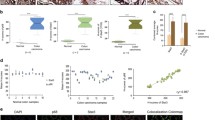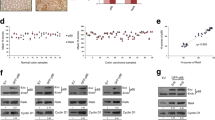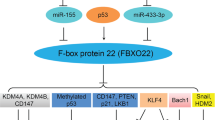Abstract
Increased abundance of proto-oncogene AKT and reduced expression of tumor suppressor Forkhead box O3 (FOXO3a), the downstream target of AKT, is frequent in carcinogenesis. Mechanistic insights of AKT gene regulation are limited. DEAD box RNA helicase p68 is overexpressed in various cancers and acts as a transcriptional co-activator of several transcription factors, including β-catenin. Here, we report a novel mechanism of p68-mediated transcriptional activation of AKT, and its ensuing effect on FOXO3a, in colon carcinogenesis. Interestingly, we found that the expression of p68 and AKT exhibits strong positive correlation in normal and colon carcinoma patient samples. In addition, p68 increased both AKT messenger RNA (mRNA) and protein, enhanced AKT promoter activity in multiple colon cancer cell lines. Conversely, p68 knockdown led to reduced AKT mRNA and protein, diminished AKT promoter activity. Here, we demonstrated that p68 occupies AKT promoter with β-catenin as well as nuclear factor-κB (NF-κB)and cooperates with these in potentiating AKT transcription. Furthermore, p68 and FOXO3a expression followed inverse correlation in the same set of colon carcinoma samples. We observed that p68 significantly reduced FOXO3a protein level in an AKT-dependent manner. Studies in primary tumors and metastatic lung nodules generated in mice colorectal allograft model, using syngeneic cells stably expressing p68, corroborated our in vitro findings. Hence, a new mechanism of oncogenesis is attributed to p68 by upregulation of AKT and consequent nuclear exclusion and degradation of tumor suppressor FOXO3a.








Similar content being viewed by others
References
Fuller-Pace FV, Moore HC . RNA helicases p68 and p72: multifunctional proteins with important implications for cancer development. Future Oncol 2011; 7: 239–251.
Janknecht R . Multi-talented DEAD-box proteins and potential tumor promoters: p68 RNA helicase (DDX5) and its paralog, p72 RNA helicase (DDX17). Am J Transl Res 2010; 2: 223–234.
Wang R, Jiao Z, Li R, Yue H, Chen L . p68 RNA helicase promotes glioma cell proliferation in vitro and in vivo via direct regulation of NF-κB transcription factor p50. Neuro Oncol 2012; 14: 1116–1124.
Pritchard CC, Grady WM . Colorectal cancer molecular biology moves into clinical practice. Gut 2011; 60: 116–129.
Moon RT, Kohn AD, Ferrari GVD, Kaykas A . WNT and β-catenin signalling: diseases and therapies. Nat Rev Genet 2004; 5: 691–701.
Crowell JA, Steele VE, Fay JR . Targeting the AKT protein kinase for cancer chemoprevention. Mol Cancer Ther 2007; 6: 2139–2148.
Roy HK, Olusola BF, Clemens DL, Karolski WJ, Ratashak A, Lynch HT et al. AKT proto-oncogene overexpression is an early event during sporadic colon. Carcinogenesis 2002; 23: 201–205.
Rychahou PG, Kang J, Gulhati P, Doan HQ, Chen LA, Xiao S-Y et al. Akt2 overexpression plays a critical role in the establishment of colorectal cancer metastasis. Proc Natl Acad Sci USA 2008; 105: 20315–20320.
Ericson K, Gan C, Cheong I, Rago C, Samuels Y, Velculescu VE et al. Genetic inactivation of AKT1, AKT2, and PDPK1 in human colorectal cancer cells clarifies their roles in tumor growth regulation. Proc Natl Acad Sci USA 2010; 107: 2598–2603.
Vivanco I, Sawyers CL . The phosphatidylinositol 3-Kinase–AKT pathway in human cancer. Nat Rev Cancer 2002; 2: 489–501.
Testa JR, Tsichlis PN . AKT signaling in normal and malignant cells. Oncogene 2005; 24: 7391–7393.
Dihlmann S, Kloor M, Fallsehr C, Doeberitz M, von K . Regulation of AKT1 expression by beta-catenin/Tcf/Lef signaling in colorectal cancer cells. Carcinogenesis 2005; 26: 1503–1512.
Huang H, Tindall DJ . Dynamic FoxO transcription factors. J Cell Sci 2007; 120: 2479–2487.
Fu Z, Tindall DJ . FOXOs, cancer and regulation of apoptosis. Oncogene 2008; 27: 2312–2319.
Bullock MD, Bruce A, Sreekumar R, Curtis N, Cheung T, Reading I et al. FOXO3 expression during colorectal cancer progression: biomarker potential reflects a tumour suppressor role. Br J Cancer 2013; 109: 387–394.
Calnan DR, Brunet A . The FoxO code. Oncogene 2008; 27: 2276–2288.
Causevic M, Hislop RG, Kernohan NM, Carey FA, Kay RA, Steele RJC et al. Overexpression and poly-ubiquitylation of the DEAD-box RNA helicase p68 in colorectal tumours. Oncogene 2001; 20: 7734–7743.
Shin S, Rossow KL, Grande JP, Janknecht R . Involvement of RNA Helicases p68 and p72 in Colon Cancer. Cancer Res 2007; 67: 7572–7578.
Malinowsky K, Nitsche U, Janssen K-P, Bader FG, Späth C, Drecoll E et al. Activation of the PI3K/AKT pathway correlates with prognosis in stage II colon cancer. Br J Cancer 2014; 110: 2081–2089.
Johnson SM, Gulhati P, Rampy BA, Han Y, Rychahou PG, Doan HQ et al. Novel expression patterns of PI3K/AKT/mTOR signaling pathway components in colorectal cancer. J Am Coll Surg 2010; 210: 767–778.
Iwamoto M, Ahnen DJ, Franklin WA, Maltzman TH . Expression of β-catenin and full-length APC protein in normal and neoplastic colonic tissues. Carcinogenesis 2000; 21: 1935–1940.
Wang X, Wang Q, Hu W, Evers BM . Regulation of phorbol ester-mediated TRAF1 induction in human colon cancer cells through a PKC/RAF/ERK/NF-κB-dependent pathway. Oncogene 2004; 23: 1885–1895.
Wang S, Liu Z, Wang L, Zhang X . NF-kappaB signaling pathway, inflammation and colorectal cancer. Cell Mol Immunol 2009; 6: 327–334.
Sakamoto K, Maeda S, Hikiba Y, Nakagawa H, Hayakawa Y, Shibata W et al. Constitutive NF-κB activation in colorectal carcinoma plays a key role in angiogenesis, promoting tumor growth. Clin Cancer Res 2009; 15: 2248–2258.
Temraz S, Mukherji D, Shamseddine A . Potential targets for colorectal cancer prevention. Int J Mol Sci 2013; 14: 17279–17303.
Tzivion G, Dobson M, Ramakrishnan G . FoxO transcription factors; regulation by AKT and 14-3-3 proteins. Biochim Biophys Acta 2011; 1813: 1938–1945.
Stahl M, Dijkers PF, GJPL Kops, Lens SMA, Coffer PJ, Burgering BMT et al. The forkhead transcription factor FoxO regulates transcription of p27Kip1 and Bim in response to IL-2. J Immunol 2002; 168: 5024–5031.
Schmidt M, de Mattos SF, van der Horst A, Klompmaker R, Kops GJPL, Lam EW-F et al. Cell cycle inhibition by FoxO forkhead trans cription factors involves downregulation of cyclin D. Mol Cell Biol 2002; 22: 7842–7852.
Karadedou CT, Gomes AR, Chen J, Petkovic M, Ho K-K, Zwolinska AK et al. FOXO3a represses VEGF expression through FOXM1-dependent and -independent mechanisms in breast cancer. Oncogene 2012; 31: 1845–1858.
Kalluri R, Weinberg RA . The basics of epithelial-mesenchymal transition. J Clin Invest 2009; 119: 1420–1428.
Du Q, Geller DA . Cross-regulation between Wnt and NF-κB signaling pathways. Forum Immunopathol Dis Ther 2010; 1: 155–181.
Zhang J, Huang K, Shi Z, Zou J, Wang Y, Jia Z et al. High β-catenin/Tcf-4 activity confers glioma progression via direct regulation of AKT2 gene expression. Neuro Oncol 2011; 13: 600–609.
Mandal T, Bhowmik A, Chatterjee A, Chatterjee U, Chatterjee S, Ghosh MK . Reduced phosphorylation of Stat3 at Ser-727 mediated by casein kinase 2 — Protein phosphatase 2 A enhances Stat3 Tyr-705 induced tumorigenic potential of glioma cells. Cell Signal 2014; 26: 1725–1734.
Paul I, Ahmed SF, Bhowmik A, Deb S, Ghosh MK . The ubiquitin ligase CHIP regulates c-Myc stability and transcriptional activity. Oncogene 2013; 32: 1284–1295.
Cai B-H, Hsu P-C, Hsin I-L, Chao C-F, Lu M-H, Lin H-C et al. p53 acts as a co-repressor to regulate keratin 14 expression during epidermal cell differentiation. PLoS One 2012; 7: e41742.
Ghosh MK, Harter ML . A viral mechanism for remodeling chromatin structure in G0 cells. Mol Cell 2003; 12: 255–260.
Sha J, Ghosh MK, Zhang K, Harter ML . E1A interacts with two opposing transcriptional pathways to induce quiescent Ccells into S phase. J Virol 2010; 84: 4050–4059.
Bhowmik A, Das N, Pal U, Mandal M, Bhattacharya S, Sarkar M et al. 2,2'-Diphenyl-3,3'-Diindolylmethane: a potent compound induces apoptosis in breast cancer cells by inhibiting EGFR pathway. PLoS One 2013; 8: e59798.
Bhattacharya S, Ghosh MK . HAUSP, a novel deubiquitinase for Rb - MDM2 the critical regulator. FEBS J 2014; 281: 3061–3078.
Acknowledgements
We thank Dr Frances V Fuller-Pace, Dr KM Yamada and Dr B Alman for gifting us the pGS5-p68 construct, pGZ21dx vector and pBI-β-catenin construct, respectively; Dr Uttara Chatterjee (Park Clinic, Kolkata, India) for providing human normal colon and colon carcinoma samples, associated pathological reports and helping in analysis of the related data; Dr Samit Adhya for kindly providing us the facility for animal lung imaging. This work is supported by grants from CSIR, India (EMPOWER-OLP-002, MEDCHEM-BSC0108 and CSIR-MAYO: MLP-0017).
Author information
Authors and Affiliations
Corresponding author
Ethics declarations
Competing interests
The authors declare no conflict of interest.
Additional information
Supplementary Information accompanies this paper on the Oncogene website
Rights and permissions
About this article
Cite this article
Sarkar, M., Khare, V., Guturi, K. et al. The DEAD box protein p68: a crucial regulator of AKT/FOXO3a signaling axis in oncogenesis. Oncogene 34, 5843–5856 (2015). https://doi.org/10.1038/onc.2015.42
Received:
Revised:
Accepted:
Published:
Issue Date:
DOI: https://doi.org/10.1038/onc.2015.42
- Springer Nature Limited
This article is cited by
-
DDX17 induces epithelial-mesenchymal transition and metastasis through the miR-149-3p/CYBRD1 pathway in colorectal cancer
Cell Death & Disease (2023)
-
USP7 targets XIAP for cancer progression: Establishment of a p53-independent therapeutic avenue for glioma
Oncogene (2022)
-
Transcription factors in colorectal cancer: molecular mechanism and therapeutic implications
Oncogene (2021)
-
The DEAD-box protein family of RNA helicases: sentinels for a myriad of cellular functions with emerging roles in tumorigenesis
International Journal of Clinical Oncology (2021)
-
LINC01116 promotes tumor proliferation and neutrophil recruitment via DDX5-mediated regulation of IL-1β in glioma cell
Cell Death & Disease (2020)




